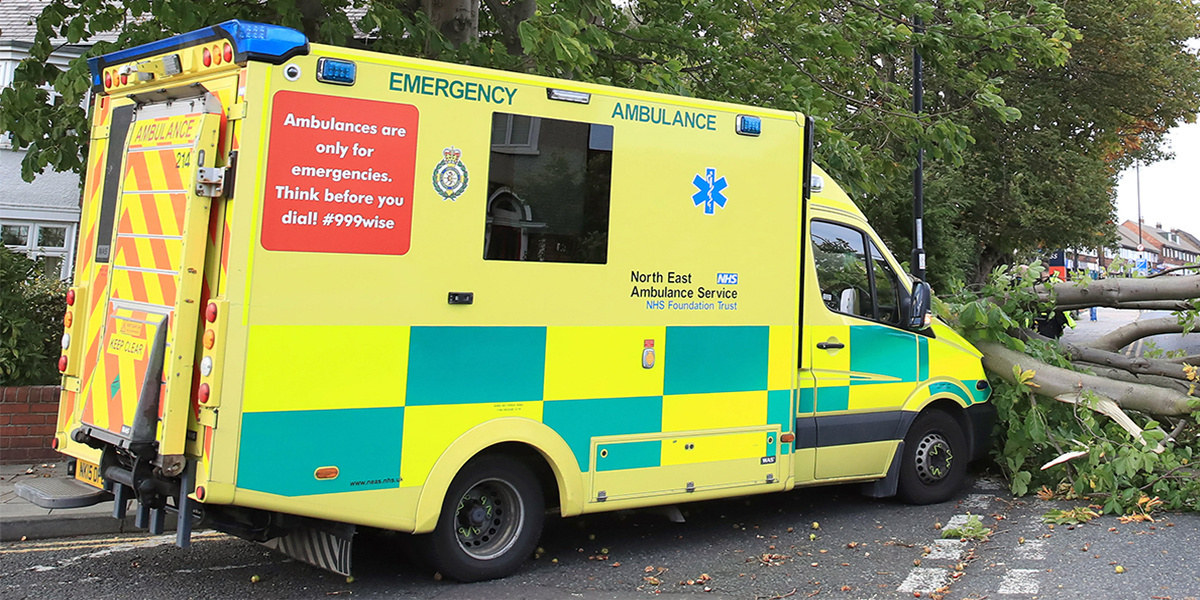
100 mph Winds Kill Two in First Named Storm to Hit UK and Ireland This Season

An ambulance crashed into a fallen tree from Storm Ali in Newcastle on Sept. 19. Owen Humphreys / PA Images via Getty Images
Storm Ali, the first named storm of the UK storm season, killed two and sent several to the hospital as winds of more than 100 miles per hour walloped Ireland, Scotland and Northern England Wednesday, The Guardian reported.
More than 250,000 homes and businesses in Ireland lost power and 30,000 lost power in southwest Scotland.
High wind also delayed flights and suspended train service in Edinburgh and Glasgow.
A cruise ship in Greenock, Scotland with 500 on board broke free from its moorings and had to be rescued by tug boats, BBC News reported.
The first death occurred Wednesday morning when wind blew a caravan off a cliff in western Ireland.
“At approximately 7:45 a.m., a report was received that a caravan had blown off the cliff at the above location. A search was carried out at the scene on the beach and after a short time the body of a female in her 50s was recovered,” Irish police said in a statement reported by The Guardian.
Locals identified the woman as Swiss tourist Elvira Ferraii, The Guardian reported.
The second fatality occurred in Northern Ireland when a tree fell on two men working for Northern Ireland Water in Slieve Gullion Forest Park. One man, in his 20s, died and the other, in his 40s, was injured.
Another woman in Cheshire County in England was seriously injured when a tree fell on her car.
A 2017 study found that climate change is projected to make wind storms in the UK more damaging, The Guardian reported at the time.
Even if warming is limited to 1.5 degrees Celsius above pre-industrial levels, the cost of destruction from wind storms could increase by more than a third in some parts of the UK.
High winds will increase in all parts of the UK except the South and Southeast, and be especially strong in the midlands, Yorkshire and Northern Ireland as warmer temperatures cause the path of Atlantic storms to shift north.
Head Gardener of the Kilmacurragh Botanic Gardens in Ireland Séamus O’Brien told The Irish Times that he could detect the footprints of climate change in Wednesday’s storm.
O’Brien said that storms were coming from the east instead of the southwest, as they had in the past, and this caused more trees to topple.
“This is part of the scenario of climate change,” he said.
The total number of trees in Ireland to fall because of Storm Ali has yet to be calculated, but the country has lost many trees to storms during the past 18 months, The Irish Times reported.
O’Brien said that his botanical garden only lost one tree, while the National Botanic Gardens in Dublin were more impacted.
O’Brien said trees were most vulnerable in soggy, wet soil but that droughts like the one Ireland faced this summer
could also pose a problem, as dry soil made trees “more prone to rocking.”
#BBC Issues First #ClimateChange Reporting Guidelines https://t.co/3yUD5G4t1f @Reportingclimat @Greenpeace @GreenpeaceUK
— EcoWatch (@EcoWatch) September 12, 2018

 233k
233k  41k
41k  Subscribe
Subscribe 